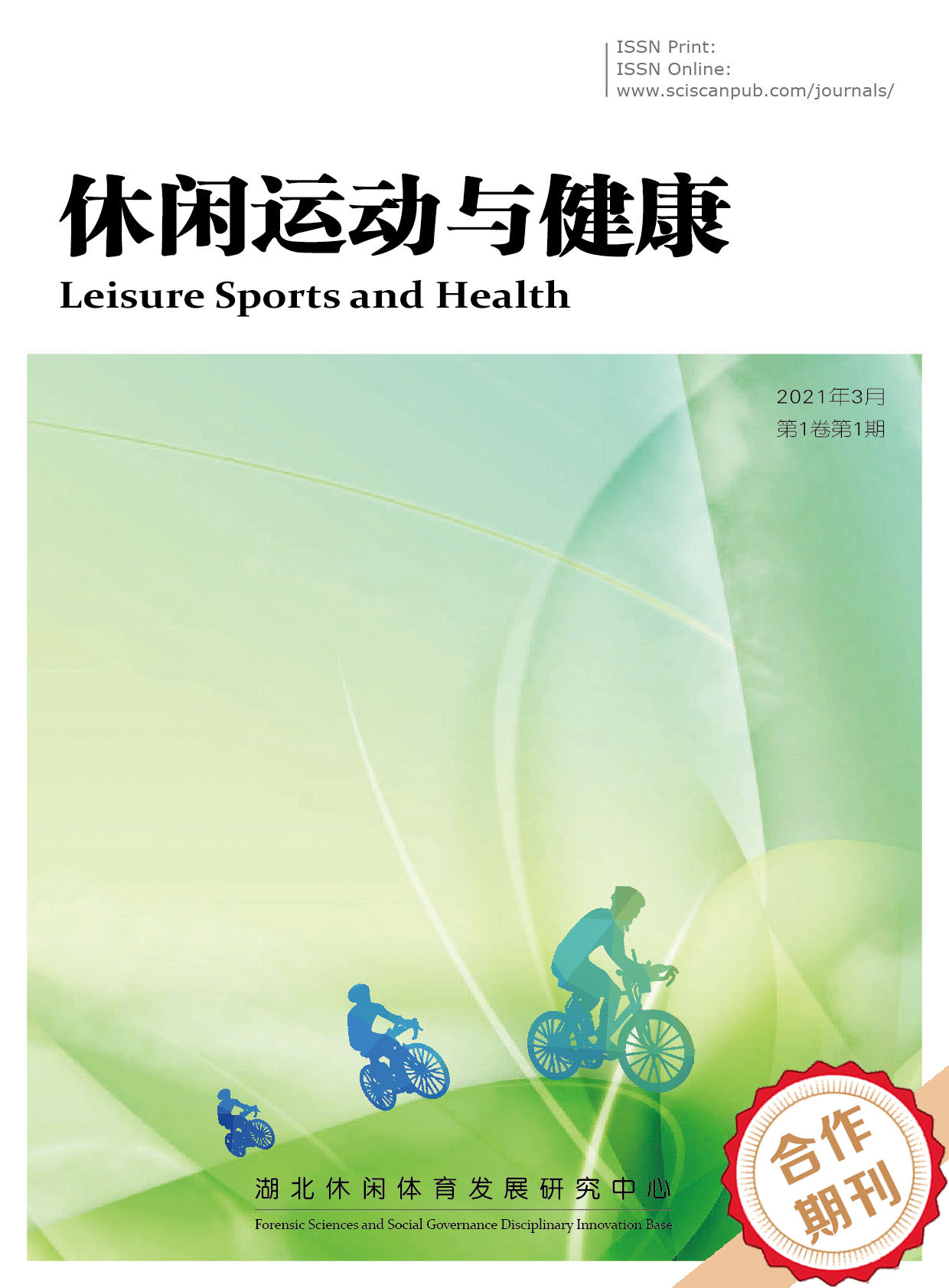Leisure Sports and Health
流行舞练习对当代女大学生身体自尊和外貌焦虑影响的研究
A Study on the Influence of Popular Dance Practice Time on Physical Self-esteem and Social Appearance Anxiety of Contemporary Female College Students
- Authors: 杨双双 代春玲 宋良元 曾子瑶
-
Information:
湖北大学体育学院,武汉
-
Keywords:
Physical self-esteem; Appearance anxiety; Popular dance-practice; Mediating effect身体自尊; 外貌焦虑; 流行舞练习; 中介效应
- Abstract: In order to explore the influence of popular dance practice on physical self-esteem and appearance anxiety of contemporary female college students, 86 female college students were investigated by Physical Self-esteem Scale (PSPP) and Social Appearance Anxiety Scale (SAAS). Pearson correlation analysis and SPSS Hayes' PROCESS were used to test the correlation and mediating effect. The results showed: 1)Appearance anxiety was significantly related to the popular dance practice time(r=-0.394, p=0.003), physical self-esteem(r=-0.337, p=0.014), PSW(r=-0.389, p=0.004), PC(r=-0.461, p=0.001), and AB(r=-0.317, p=0.021)dimensions in physical self-esteem negative correlation;2)Physical self-esteem was positively correlated with the duration of pop dance practice time;3)The results of the mediating effect test showed that physical self-esteem had a significant positive predictive effect on the popular dance practice time (B=0.4032, p=0.0028) and the popular dance practice time had a significant negative predictive effect on appearance anxiety (B=-0.3085, p=0.0308). And when the popular dance practice time was used as a mediating variable, the direct effect of the model was not significant(p=0.1314), but the total effect (B=-0.4501, p=0.013<0.05, t=-2.558) and the mediating effect (B=-0.1660, Boot LLCI=-0.3803, Boot ULCI=-0.0250) was significant. It indicates that in this model, the popular dance practice time plays a fully mediating role, and the mediating effect accounts for 36.8% of the total effect. Conclusion: Female college students' Physical self-esteem affects appearance anxiety through the mediating effect of the popular dance practice time. 为探讨流行舞练习对当代女大学生身体自尊及外貌焦虑的影响,本研究采用身体自尊量表(PSPP)和外表焦虑量表(SAAS),对86名女大学生进行调查研究,并使用皮尔逊相关性分析和SPSS的Hayes’ PROCESS来检验相关和中介效应。结果显示:(1)外貌焦虑与流行舞练习时长(r=-0.394,p=0.003)、身体自尊总分(r =-0.337,p=0.014)、身体自尊中的PSW(r =-0.389,p=0.004)、PC( r=-0.461,p=0.001)和 AB( r=-0.317,p=0.021)维度呈显著负相关;(2)身体自尊与流行舞练习时长呈显著正相关;(3)中介效应检验结果显示,身体自尊对流行舞练习时间有显著的正向预测作用(B=0.0292,se=0.0093,t=3.1464,p=0.0028),流行舞练习时长对外貌焦虑有显著的负向预测作用(B=-5.6776,se=2.5539,t=-2.2231,p=0.0308)。而当流行舞练习时长作为中介变量时,模型的直接效应不显著(p=0.1314),但总效应 (B=-0.4501, p=0.013<0.05, t=-2.558)和中介效应(B=-0.1660,Boot LLCI=-0.3803, Boot ULCI=-0.0250)显著。这表明,在这个模型中,流行舞练习时长起到了完全的中介作用,中介效应占总效应的36.8%。结论:女大学生的身体自尊通过流行舞练习时长的中介作用影响外貌焦虑。
- DOI: https://doi.org/10.35534/lsh.0203007 (registering DOI)
-
Cite:
杨双双,代春玲,宋良元,等.流行舞练习对当代女大学生身体自尊和外貌焦虑影响的研究[J].休闲运动与健康,2022,2(3):38-44.
1 前言
青少年身心健康一直是国家重点关注的问题,党中央领导出台了一系列文件,旨在推动青少年的全方位健康发展。从新中国成立之初“要使青少年身体好,学习好,工作好”的口号[1],到《关于加强青少年体育增强青少年体质健康》(2007)[2]、《体育强国建设纲要》(2019)[3]、《关于深化体教融合 促进青少年健康发展的意见》(2020)[4]等一系列文件的出台,均说明了我国对青少年健康发展的重视。这里的健康发展不仅包括身体上的健康,还包括心理上的健康。在2021年11月底的全国高校有关心理健康的教育会议中,教育部强调要全方位积极培育高校学生的心理品质,以促进高校学生心理健康为目标,推动其心理健康工作的高效发展。
青少年群体中的女大学生,由于自身的生理和心理特点,以及互联网上对女性的各类评价标准等,在学习或人际交往方面,会考虑到外观所带来的影响力[5],尤其是当代女性在社交媒体上关注的越多、越重视自我呈现,越容易产生对自身外貌不满的负面情绪[6],如担心外貌成为不被他人喜欢的理由、焦虑外貌达不到他人的要求等等,导致她们更容易出现心理困扰,这种对自身长相或身材感到不满意的忧虑苦恼的不良心理即是外貌焦虑。研究证明,女性对于长相或身材的焦虑水平显著高于男性[7],中青校媒在向全国2063名高校学生展开外貌焦虑的问卷调查时,发现59.03%的大学生有一定程度的外貌焦虑,且女大学生中度焦虑的水平比男大学生高22.53%[8]。因此如何站在女大学生角度,有效增强女大学生对自身外貌或身材的满意度,是促进高校女大学生心理健康发展的重中之重。
身体自尊(Physical self-esteem)被定义为与社会评价密切相关的“个体对自我身体的不同方面的评价”[9],对情感和心理状况发挥着重要的作用[10]。研究表明,身体形态会密切影响一个人的身体自尊,甚至是整体自尊[11],体重也与个体对自身的满意感存在密切关联[12]。因此提高身体自尊,个体对自己的身体会更加满意,更倾向于接纳自己,从而能正视自身的优缺点,这对高校大学生心理健康发展有着不小的促进作用。
研究表明,科学的体育锻炼有利于调节和促进人的身心健康,能够改善人们的不良心境。“全民健身计划”也一直在鼓励群众积极参与马拉松、健身、游泳、冰雪等运动项目,一方面是以增强体能为目的,另一方面则是对锻炼者身体和心灵的训练[13]。流行舞作为一种符合时代潮流的锻炼方式,具有时尚性、娱乐性、集体性等特点,包含爵士舞、街舞、拉丁舞等各类型多种多样的舞蹈,受到了多数女大学生的喜爱。流行舞的练习能够对女大学生的外在表现有一定的积极作用,通过肢体的拉伸、动作的练习展现女性身形之美,能够提高女大学生的自信感和表现力[14],可有效增强女大学生对自身身材的满意度,基于此,可以进行本研究的第一步假设H1:流行舞的练习能有效降低女大学生的外貌焦虑程度。不仅如此,学生还可以通过学跳流行舞,获得更为全方位的锻炼,提高自己的身体协调能力并形成优美的体态,还能增强自己的人际交往能力和审美能力,更愿意正视自身的优缺点去接纳自己,因此提出假设H2:流行舞的练习能显著提高女大学生的身体自尊。此外,身体自尊高的女大学生善于与人交流,更易在人群之中展现自己,这在一定程度上也会影响到她们愿意去学习流行舞的时长,进而影响到外貌焦虑程度的高低,即提出假设H3:流行舞练习时长在身体自尊与外貌焦虑之间起到中介作用。
综上,本文对正在进行流行舞学习的女大学生进行身体自尊与外貌焦虑两方面的调查,旨在探讨学习流行舞不同时长的女大学生身体自尊及外貌焦虑的差异,并多角度分析其影响因素,对假设H1、H2、H3进行验证。不仅可以丰富身体自尊与外貌焦虑的理论成果,还可以为如何有效降低女大学生外貌焦虑、提高身体自尊提供有效的建议,为当代高校体育课程培养方案提供新的参考意义。
2 研究设计
2.1 研究对象
选取武昌区高校女大学生86名,根据流行舞学习时长分为三组,分别为短期学习组(1.5年以内)30人;长期学习组(1.5年以上)27人;以及未参加过流行舞学习的女大学生29人。
2.2 研究工具
1)身体自尊水平的评定工具
当前我国研究者对于身体自尊的测量所使用的量表和问卷主要包括:徐霞等修订的大学生身体自尊量表(PSPP)[15]、杨剑修订的身体自我描述问卷(PSDQ)[16]和何玲等修订的身体自尊量表(BES)[17]。其中PSPP量表信效度较高,针对大学生编制,且在国内大学生身体自尊的研究中应用广泛,因此本研究选择适用大学生的身体自尊量表(PSPP)进行分析。
学者徐霞修订的《身体自尊量表》(PSPP),其主量表和各分量表的Cronbacha’s α系数在0.75~0.82,表明该量表内部一致性较好,具有良好的信度。量表中的所有题目都有两种表达方式,被调查者在填写问卷时从中选择符合自己的一种表达,再去选择“有些符合”或“完全符合”。该量表采用的是四点计分法,每题的得分范围为1~4分,量表最终的计分总数应在30~120分。修订之后的量表包括2个领域共5个维度:
表 1 《身体自尊量表》(PSPP)分类
| 等级 | 量表 | 解释说明 | 分量表题号 |
| 主领域 | 身体自我价值感(PSW) | 对身体自我方面的总体自豪感、满意感、愉悦感和自信心 | 5,10,15,20,25,30 |
| 次领域 | 运动技能(SC) | 专项运动能力、学习运动技能能力、竞赛自信 | 1,6,11,16,21,26 |
| 身体状况(PC) | 身体健康状况、体力、保持锻炼能力、对锻炼情景的自信心 | 2,7,12,17,22,27 | |
| 身体吸引力(AB) | 测量身体保持吸引力的能力和对身体外貌的自信心 | 3,8,13,18,23,28 | |
| 身体素质(PF) | 测量耐力、速度、力量、灵活度、敏感度 | 4,9,14,19,24,29 |
2)外貌焦虑的评定工具
本研究采用Trevor和David编制(2008)的《社会外表焦虑量表》(the social appearance anxiety scale,SAAS)[18],该量表主要测试被调查者对自身的整体性外表焦虑,如“我会焦虑自己的外貌达不到他人的要求”,这种对自身外貌的焦虑包括全身,从心理至外表的整体性焦虑,而并非是只针对如鼻子、眼睛等的具体焦虑。因此恰好符合流行舞对学习者整体的身体变化及自信心等方面的要求,适合采用此量表。
量表共包含16个项目,采用五点计分法,每题的得分范围在1(非常符合)~5(非常不符合)分,其中项目一为反向计分,量表最终的总数在16~80分,得分越高,代表其外貌焦虑程度越高。该量表的Cronbacha’s α为0.79,表明具有良好的内部一致性。
2.3 研究方法
1)文献资料法
以“身体自尊”“外貌焦虑”“流行舞”等为关键词,整理关于流行舞对女大学生“身体自尊”与“外貌焦虑”的研究,梳理过往相关研究思路,为本研究的选题及实验的开展提供理论依据。
2)问卷调查法
本次调查共发放91份问卷,回收91份问卷,其中有效问卷86份,有效问卷率为94.5%。在调查流行舞学习的57名女大学生时,采取舞蹈室课间休息时间进行问卷的发放与回收,在发放问卷时再次对问卷的题目做了解释;在同一时段,对未参加流行舞学习的29名女大学生进行问卷的发放与回收,保持时间上的统一。
3)访谈法
在进行问卷调查时,与被调查者进行面对面访谈,询问她们在学习流行舞前后的变化、对流行舞目前发展现状的看法,以及对于高校开展流行舞课程的想法等等,为本次调查提供切实可行的建议。
4)数理统计法
将被调查的86名女大学生的相关问卷所得的数据经过处理后,运用SPSS 25.0统计软件建立数据库并进行统计分析,各变量之间的关系采用皮尔逊相关性分析,p<0.01表示具有非常显著性的差异,p<0.05表示具有显著性的差异。使用Spss的Hayes’ Process探索流行舞练习时长的中介作用,并使用bootstrap方法对中介效应进行检验,所得各组分析结果为本次研究提供数据支持。
3 研究结果
3.1 女大学生外貌焦虑与身体自尊和流行舞练习的相关分析
表 2 各变量间的相关性系数矩阵(n=86)
| 1 | 2 | 3 | 4 | 5 | 6 | 7 | |
| 外貌焦虑 | - | ||||||
| 练习时长 | -0.394** | - | |||||
| PSW维度 | -0.389** | 0.360** | - | ||||
| SC维度 | -0.155 | 0.280* | 0.516** | - | |||
| PC维度 | -0.461** | 0.413** | 0.715** | 0.534** | - | ||
| AB维度 | -0.317* | 0.426** | 0.748** | 0.323* | 0.589** | - | |
| PF维度 | -0.034 | 0.145 | 0.388** | 0.734** | 0.574** | 0.195 | - |
| 身体自尊总分 | -0.337* | 0.403** | 0.843** | 0.794** | 0.865** | 0.699** | 0.751** |
注:*p<0.05,有显著性;**p<0.01,非常显著性。
从表2可见,外貌焦虑与身体自尊总分及其部分维度和流行舞练习时长呈负相关关系,具体表现为外貌焦虑与身体自尊中的身体自我价值感维度(PSW)以及身体状况维度(PC)有非常显著性的差异(p<0.01),与身体吸引力维度(AB)具有显著性的差异(p<0.05),这表明女大学生身体自尊中身体自我价值感维度(PSW)、身体状况维度(PC)和身体吸引力维度(AB)得分越高,外貌焦虑越低。说明可以通过提高女大学的身体自尊水平从而降低外貌焦虑。通过对外貌焦虑与流行舞练习时长的相关分析可知,随着流行舞练习时长的增加外貌焦虑会显著下降,两者存在负相关关系(p<0.01)。表明流行舞练习与外貌焦虑有着极其密切的关系,对女大学生外貌焦虑影响较大,即随着女大学生流行舞练习时长的增加,外貌焦虑将显著降低。
3.2 女大学生身体自尊各维度与流行舞练习时长的相关分析
通过对流行舞练习时长与身体自尊5个维度的相关分析可知(见表2),随着流行舞练习时长的增加,身体自尊中PSW维度(p<0.01)、SC维度(p<0.05)、PC维度(p<0.01)和AB维度(p<0.01)呈直线上升;说明流行舞练习与身体自尊水平有着十分紧密的关系,对女大学生的身体自尊影响较大。随着女大学生流行舞练习的增加,其身体自尊中4个维度得分也呈上升趋势,存在正相关关系,即身体自尊身体会随着流行舞练习时长的增加而提高。
值得注意的是,虽然流行舞练习时长与身体自尊呈正相关关系,流即行舞练习时间越长,越有助于运动技能(SC)、身体自我价值感(PSW)、身体状况(PC)以及身体吸引力(AB)的提高,但却与身体素质(PF)维度并无统计学意义(p>0.05)。
3.3 流行舞练习时长的中介作用分析
为进一步检验各变量之间的关系,探讨流行舞练习在身体自尊与外貌焦虑之间的作用,本研究采用SPSS的Hayes’ Process分析以流行舞练习时间作为中介变量(M)、身体自尊作为自变量(X)、外貌焦虑作为因变量(Y)来进行中介效应分析,并使用bootstrap方法对中介效应进行检验。
1)流行舞练习时长的中介效应检验
表 3 流行舞练习的中介效应分析
| 中介变量 | 间接效应值 | Boot标准误 | BootLLCI | BootULCI |
| 流行舞练习 | -0.1660 | 0.0903 | -0.3803 | -0.025 |
使用偏差校正非参数百分比bootstrap检验对流行舞练习在身体自尊与外貌焦虑之间的中介效应,重复取样5000次,计算95%置信区间,中介效果量如表2所示:女大学生流行舞练习的置信区间上下限为(-0.3803,
-0.025),区间不包含0,因此此中介效应成立。
2)流行舞练习时长的中介作用

图 1 流行舞练习时长的中介效应图示
结果如图1所示:身体自尊对流行舞练习时间有显著的正向预测作用(B=0.0292,se=0.0093,t=3.1464,p=0.0028),流行舞练习时长对外貌焦虑有显著的负向预测作用(B=-5.6776,se=2.5539,t=-2.2231,p=0.0308)。而当流行舞练习时间作为中介变量时,模型的直接效应不显著(p=0.1314),但总效应(B=-0.4501,p=0.013<0.05,t=-2.558)和中介效应(B=-0.1660,Boot LLCI=-0.3803,Boot ULCI=-0.0250)显著。这表明,在这个模型中,流行舞的练习时间起到了完全的中介作用,中介效应占总效应的36.8%,即身体自尊需要通过流行舞的练习来影响外貌焦虑。
4 分析讨论
4.1 外貌焦虑与身体自尊的关系
自尊是指个体对自身身体特点、个性、社会身份和行为的评价或情感反应[19],对预测情感和生活的变化有积极作用。而身体自尊是整体自尊(如图2)的核心部分[20],包含“主领域”与“次领域”两个等级。主领域主要是对身体自我价值感的评价,次领域即指对自身更加具体、详细的身体方面满意感的评价(如表1),这些个体对自我身体不同方面的满意或不满意的感觉均是与社会评价密切相关的[21]。多年来大量研究表明,自尊水平越高的人,其外貌焦虑越低。根据本研究各变量相关性分析中,可以发现亦是如此,身体自尊总分越高的女大学生,其外貌焦虑程度越低。国外有学者研究得出,高外貌焦虑水平群体往往伴随着消极的人格特征,即更低的自尊水平[22]。值得注意的是,外貌焦虑水平的高低并不能完全显著影响到身体自尊的各个维度。由表2可知,外貌焦虑程度与身体自尊中的“运动技能(SC)”和“身体素质(PF)”维度并无显著性差异。通过访谈可以发现,对于她们来说,运动技能的高低与身体素质的好坏只是会影响到体育课程成绩的评判,又或者是每学期的体质测试,而真正能影响到外貌焦虑的,还是她们对自身的认可程度以及外在条件。通过流行舞的学习,通过在群体之间的展示,逐渐培养自信,淡然正视自身的优缺点,身体自我价值感就会提高,身体的体态、状况也会逐渐越好,对自身的身体吸引力自然也会越来越满意。

图 2 自尊等级结构模型
4.2 外貌焦虑与流行舞练习时长的关系
个体在社会环境中,以社会理想为审美,审视自己是否达到公众的审美标准,根据此标准对自身的外在做出负面的评价,学者Keelan和Dion将上述这些因为担心他人对自身做出相同负面评价的悲观心理和消极状态统称为外貌焦虑[23]。当下,各种网络媒体或现实生活中对女性的要求越来越严格,体重过百、素颜等让女性越来越没有自信,不善于交际,尤其对于20岁左右的女大学生们,更会在意其他人的看法,是否被他人认可,更容易产生外貌焦虑,而通过本次调查分析,可以发现流行舞的学习能有效降低学生们的外貌焦虑程度,与本研究假设H1一致。流行舞作为一种时尚、紧随潮流的现代健身方式,深受当代女大学生们的喜爱,不仅能有效提高学习者的身体协调能力,形成优美的体态,提升学习者对自身身材的满意度,还能在学习的同时交到更多的朋友,提高人际交往能力和审美能力,增强表现力,从而促使女大学生的身心得到健康的发展,降低外貌焦虑。本研究表明,流行舞练习时间越长的女大学生,其外貌焦虑水平越低,具有非常显著性的差异(p<0.01)。所有的运动都需要长期坚持才能有效改善现状,流行舞练习时间越长,身形才会得到明显的改善,长时间在同学面前展示自己一节课所学到的成果,自信才会渐渐提升。当下,青年群体们对主流审美观有着共同的理解,如出门必化妆、体重不过百等,而那些没有共同理解、不符合主流审美的人则会出现外貌焦虑[24]。但对于学习流行舞的女大学生来说,时尚是不断在变化的,流行舞的音乐、风格、情感也处于多变万化之中,长时间流行舞的学习,会不断更新对自身的认知,对于女大学生外貌焦虑的改善有一定的积极作用。
4.3 身体自尊与流行舞练习时长的关系
根据对身体自尊与流行舞练习时长关系的探究可以发现,女大学生流行舞学习的时长与身体自尊总体水平呈正相关关系,且具有非常显著性的差异,与本研究假设H2一致,而本研究所得到的正相关关系也与其他以大学生作为被试的一些国内及国外研究得到了相似的结论。如一个学期的啦啦操锻炼能高效改善女大学生的身体自尊水平[25],8周16次的普拉提垫上运动的教学能明显提升女大学生的运动能力、自我价值感、身体状况、身体吸引力、身体素质[26]。
值得注意的是,流行舞练习时长与身体自尊中的“身体素质(PF)”维度并无显著性差异。有可能是因为该身体自尊量表主观性较强,所有的选择均是由学生的主观意识所判断的,而她们在学习流行舞的时候,关注更多的是流行舞的练习是否增强了自身吸引力,是否提升了气质、练就了好的身材等等,身体素质主要测量耐力、速度、力量等,对于练习流行舞的女大学生来说,她们更多的是追寻自己想要的“美感”,对于“身体素质”这一方面并不会刻意去关注。通过对国内外有关身体自尊文章的梳理可以发现,不同运动的练习均能有效改善被试者的身体自尊,但不同的运动对其各个维度的影响却有不同的差异。如刘璇通过对健身房会员进行12周的花式动感单车运动实验,发现虽然动感单车对练习者身体形态方面的影响不大,但对练习者的身体自尊及幸福感均有一定程度的提升,有利于改善练习者的情绪,使练习者身心愉悦[27]。
4.4 流行舞练习时长在女大学生中身体自尊与外貌焦虑的中介作用
对中介效应的分析结果发现,流行舞练习时长在女大学生身体自尊与外貌焦虑中具有完全的中介作用,与本研究假设H3一致,具体为中介效应β=-0.1660(Boot LLCI=-0.3803,Boot ULCI=-0.0250),占总效应的36.8%,说明在女大学生身体自尊对外貌焦虑的作用中,存在着通过流行舞练习时长再作用于外貌焦虑的间接作用路径,即身体自尊的提高会通过增加流行舞的练习时长而降低女大学生外貌焦虑的程度。
尽管人们就身体自尊与外貌焦虑进行了不少的研究,但对它们之间中介机制的研究还未见报道。本研究的结果表明,对于学习流行舞的女大学生来说,流行舞的练习时长在身体自尊与外貌焦虑之间具有中介作用,进一步深化了人们对身体自尊与外貌焦虑之间的认识,也为女大学生外貌焦虑的降低提出了新且健康的路径。该中介结果启示,在今后为降低女大学生外貌焦虑时,在提升其身体自尊的同时,一定要合理安排规划流行舞的练习时长,坚持的时间越长,降低外貌焦虑的效果越显著。
5 结论
外貌焦虑与身体自尊总分及其身体自我价值感维度(PSW)、身体状况维度(PC)、身体吸引力维度(AB)呈显著负相关,即身体自尊总分和其PSW、PC、AB维度得分越高,外貌焦虑越低。
外貌焦虑与流行舞练习时长呈显著负相关,即流行舞练习时长越久,外貌焦虑越低。
流行舞练习时长与身体自尊中的运动技能(SC)、身体自我价值感(PSW)、身体状况(PC)、身体吸引力(AB)4个维度显著正相关,即流行舞练习时长越久,身体自尊中SC、PSW、PC和AB维度得分越高。
流行舞练习时长在身体自尊与外貌焦虑之间起完全中介作用,即身体自尊可以通过流行舞练习来改善女大学生的外貌焦虑。
参考文献:
[1] 胡为雄.建国后毛泽东教育思想的发展与演化[J].毛泽东邓小平理论研究,2018(3):86-94+108.
[2] 中共中央国务院关于加强青少年体育增强青少年体质的意见[J].时政文献辑览,2008:47-51.
[3] 国务院办公厅.国务院办公厅关于印发体育强国建设纲要的通知[EB/OL].[2019-09-02].http://www.gov.cn/gongbao/content/2019/content_5430499.htm.
[4] 国家体育总局,教育部.国家体育总局、教育部联合印发《关于深化体教融合,促进青少年健康发展的意见》[J].体育博览,2020(11):14-5.
[5] 黄子妍.社交媒体使用对女大学生外貌焦虑的影响研究[D].上海:上海外国语大学,2021.
[6] Tiggemann M,Anderberg I,Brown Z.Uploading Your Best Self:Selfie Editing and Body Dissatisfaction[J].Body Image,2020,33:175-82.
[7] Hagger M,Stevenson A.Social Physique Anxiety and Physical Self-esteem:Gender and Age Effects[J].Psychology & Health,2010,25(1):89-110.
[8] 中国青年报:近六成大学生有容貌焦虑:女生焦虑感更强,更在意外界评价[EB/OL].[2021-02-25].http://zqb.cyol.com/html/2021-02/25/nw. D110000zgqnb_20210225_1-07.htm.
[9] Fox,Kenneth R.The physical self:From motivation to well being[M].Champaign,IL,US:Human Kinetics,1997.
[10] Sonstroem.Attitude testing examining certain psychological correlates of physical activity[J].Research Quarterly,1974,45(2):93-103.
[11] 刘洋.中学生体育锻炼与身体形态身体自尊的相关分析[J].中国学校卫生,2013,34(2):196-19.
[12] Claire L,Fox,Claire V,et al.Global and physical self-esteem and body dissatisfaction as mediators of the relation ship between weight status and being a victim of bullying[J].Journal of Adolescence,2009,32(5):1287-1301.
[13] 刘燕.审美与自我呈现:青年女性容貌焦虑的深层逻辑[J].中国青年研究,2022(5):85-92.
[14] 沈小燕.流行舞对女大学生身体素质和心理健康的影响[D].苏州:苏州大学,2017.
[15] 徐霞,姚家新.大学生身体自尊量表的修订与检验[J].体育科学,2001(2):78-81.
[16] 杨剑.身体自我描述问卷(PSDQ)的介绍与修订[J].山东体育科技,2002(1):83-6.
[17] 何玲,张力为.抽象及其具体身体自尊评价方式与生活满意感的关系[J].北京体育大学学报,2002(3):320-3+30.
[18] Hart T A,Flora D B,Palyo S A,et al.Development and examination of the social appearance anxiety scale[J].Assessment,2008,15(1):48-59.
[19] Zhang L.Life satisfaction in Chinese people:The contribution of collective self-esteem[J].2001.
[20] Shavelson R J,Hubner J J,Stanton G C.Validation of construct interpretations[J].Review of Educational Research,1976,46(3):407-41.
[21] Berlin J.False Impression:Medicine Says Medicare Report Inflates Success of Quality Program [J].Texas Medicine,2019,115(6):32-7.
[22] Hebl M R.The swimsuit becomes us all:ethnicity,gender,and vulnerability to self-objectification[J].Personality & Social Psychology Bulletin,2004,30(10):1322.
[23] Dion K L,Dion K K,Keelan J P.Appearance anxiety as a dimension of social-evaluative anxiety:Exploring the ugly duckling syndrome[J].journal of personality & social,1990.
[24] 理查德·斯科特.制度与组织:思想观念与物质利益[M].北京:中国人民大学出版社,2010.
[25] 陈柳倩.舞蹈啦啦操对广州市普通高校女大学生身体自尊影响的实验研究[D].广州:广州体育学院.
[26] 孙焕宇.普拉提垫上运动对女大学健康体适能和身体自尊的影响[D].沈阳:沈阳师范大学,2020.
[27] 刘家璇,张有明.花式动感单车运动对练习者身体形态,身体自尊及幸福感的影响研究[J].体育风尚,2021(6):25-6.
















